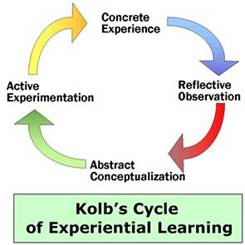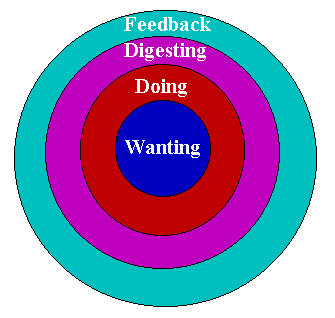|
|
 |
|
"Learning may be defined as the process of making a new or revised interpretation
of the meaning of an experience, which guides subsequent understanding, appreciation and action." J. Mezirow, 1991.
Below are a number of different ways of conceptualising learning. The main ones are Kolb's
learning cycle and Honey and Mumford's learning styles derived from the cycle. Also Race's Ripples model.
Kolb's Learning Cycle is
one of the most influential models that describes the learning process as a cycle
of experiencing, reflecting, theorising, and taking action. A learning style is an individual's preference
for a particular stage in the cycle or combination of stages but the preference need not necessarily be strong.
There are of course many different 'learning styles' concepts. For an extensive critical review of the Learning
Styes literature and a detailed examination of 13 influential models download Coffield at al.'s
review, 2004: Learning styles and pedagogy in post-16 learning.

|
| Click on diagram to go to J. S. Atherton's exposition on experiential learning |
Kolb posits that there are 4 stages
in the learning process:
Immediate
or concrete experiences (CE). These provide a basis for reflections and observations (RO) and become
assimilated into abstract concepts (AC), which produce new ideas for active experimentation
(AE).
This
leads to new concrete experiences and reactivation of the cycle.
David Kolb is an influential developer
of Experiential Learning Theory. He posits that there are four learning styles that emerge from different ways people
perceive and process experience. He first published his cyclical model in 1984.
(Free resources at Business Balls.) Listen to David Kolb and Alice Kolb describe the LS model on his website.
The website
(Experience Based Learning Systems) has material and articles on
his theory, the learning cycle, and his Learning Style Inventory
(LSI).
Naturally Kolb is not without his critics. Dr Roger Greenaway has assembled articles by others who discuss Kolb's theory from its original proposition to some of its current
refinements and applications. Critics suggests caution in unquestioning
acceptance or universal application.
|
 |
| Click model for more detail. |

|
| Clark, D. R. (2004), Instructional System Design Concept Map. Retrieved 1st May, 2009 |
Honey and Mumford's model is derived from Kolb's Learning Cycle. They posit
that there are four types of learners - activists, reflectors, theorists and pragmatists. These styles directly correspond
to the stages in the cycle, as distinct from Kolb's more complex model in which a learning style is a combination of two
opposing stages.
- Despite the controversy evoked by the Coffield report (2004) about the validity of the learning styles concept the H&M Learning Styles Questionnaire remains a widely used instrument in business and educational settings.
| Click model for more detail |

|
| Race's Ripples Model |
Dr Phil Race, a staff developer in higher education, finds Kolb (and other cyclical models
of experiential learning) prescriptive and too academic. He has created a 'Ripples'
Model of Learning (See Powerpoint presentation and many other resources on his
webpage.)
"The best way I've so far found to describe my 'wanting, doing, feedback, digesting' model of learning
is as 'ripples on the pond', with each of the four processes in dynamic interaction with the rest. Feedback to learners comes
from all directions - fellow students, learning resources, expert witnesses such as tutors, and so on." Phil Race.
Read his article - How does learning happen best?
Why Reflect? What are the pedagogical and physiological foundations of reflection for learning?
Why is reflection important for learning? What does the literature say about how reflection supports learning? Neurobiologist
Zull points out that reflection is a search for connections and also suggests that we have to seriously consider the role
of emotion if we want to foster deep learning.
Learning Styles Notes. (2002, updated 2008) Steve Draper, Psychology Department, University of Glasgow. An introduction to
thinking about learning styles.
Paragon Learning Style Inventory (PLSI) - self-administered providing an indication of learning style and cognitive preference.
This site has a 48-item general version using the four Jungian dimensions (i.e, introversion/ extroversion, intuition/sensation,
thinking/feeling, and judging/perceiving). These are the concepts used by Myers-Briggs.
|
 |
|
|
 |
|
|
 |
|
|
|
|
Enter supporting content here
Val Bissland, Strathclyde University
|
|
|
 |

